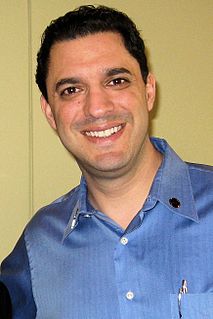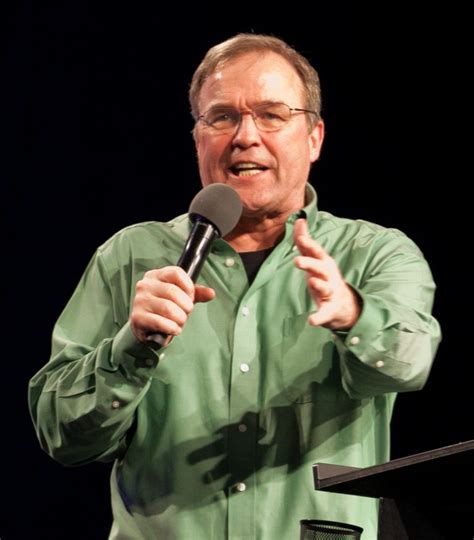A Quote by Brian D. McLaren
Ask me if Christianity (my version of it, yours, the Pope's, whoever's) is orthodox, meaning true, and here's my honest answer: a little, but not yet. Assuming by Christianity you mean the Christian understanding of the world and God, Christian opinions on soul, text, and culture I'd have to say that we probably have a couple of things right, but a lot of things wrong, and even more spreads before us unseen and unimagined. But at least our eyes are open! To be a Christian in a generously orthodox way is not to claim to have the truth captured, stuffed, and mounted on the wall.
Quote Topics
Related Quotes
I've had lots of discussions with my Muslim brothers and sisters who have said to me, "Christianity is a white man's religion" But I'm like, "how is that possible when Christianity went into Africa before it ever went into central Europe?" Even the first people to become a Christian nation were not Romans, they weren't the Byzantines either, they weren't the Greeks... the first people to claim a Christian empire were the Armenians.
In a Christian Theocracy, you'll never be Christian enough. There's always going to be somebody there with another version of Christianity that is more Christian than you and you're going to lose the freedom to make the choice because you didn't defend the Separation of Church and State when you had the chance.
A Christian boy or girl can learn mathematics, for example, from a teacher who is not a Christian; and truth is truth however learned. But while truth is truth however learned, the bearing of truth, the meaning of truth, the purpose of truth, even in the sphere of mathematics, seem entirely different to the Christian from that which they seem to the non-Christian; and that is why a truly Christian education is possible only when Christian conviction underlies not a part but all, of the curriculum of the school.
There is no ground whatever for the claim, so often made by religious apologists, that these ideals are specifically Christian and originated with Jesus. What were specifically Christian were some of the less enlightened teachings, which have done untold harm. Christians claim that organised Christianity has been a great force for good, but this view can be maintained on one assumption only: that everything good in the Christian era is a result of Christianity and everything bad happened in spite of it.
In two areas above all others the Christian demonstration of love and communication stands clear: in the area of the Christian couple and their children; and in the personal relationships of Christians in the church. If there is no demonstration in these two places, on the personal level, the world can conclude that orthodox Christian doctrine is nothing but dead, cold words.
Why did the consensus of Christian churches not only accept these astonishing views but establish them as the only true form of Christian doctrine? . . . these religious debates - questions of the nature of God, or of Christ - simultaneously bear social and political implications that are crucial to the development of Christianity as an institutional religion. In simplest terms, ideas which bear implications contrary to that development come to be labeled as 'heresy'; ideas which implicitly support it become 'orthodox.'
In the Christian world, as you remember, Christianity is in the 21st century, Islam is in the 15th century. I don't mean to say that Islam is backward; I mean to say that there are certain experiences that it hasn't gone through. Christianity had the great religious wars of the 17th century. Islam, fortunately for the Muslims, did not have that. Christianity worked out a system of toleration. Islam was always more tolerant of Christendom.
Liberal Christianity, of course, has enemies, but they are everyone's enemies - sexism, racism, homophobia. But liberal versions of Christianity, which can be both theologically and politically conservative, assume that what it means to be Christian qua Christian is to have no enemies peculiar to being Christian.
Religion is much more than language, but to be Christian does mean speaking Christian for most people. The language many of us use has contributed to the crisis in Christianity in North America. Traditional Christian language is becoming less familiar to millions of people. The language is frequently misunderstood by people.
People are very surprised to hear me say that a lot of my values are Christian values. I think that's part of my shock. I just don't like the way that Christianity combined with the influence of television has bred a nation of weakness. (Christian television do get the facts wrong sometimes and the image they portray turns most people off.)
That the religious right completely took over the word Christian is a given. At one time, phrases such as Christian charity and Christian tolerance were used to denote kindness and compassion. To perform a "Christian" act meant an act of giving, of acceptance, of toleration. Now, Christian is invariably linked to right-wing conservative political thought -- Christian nation, Christian morality, Christian values, Christian family.
Christian community is like the Christian's sanctification. It is a gift of God which we cannot claim. Only God knows the real state of our fellowship, of our sanctification. What may appear weak and trifling to us may be great and glorious to God. Just as the Christian should not be constantly feeling his spiritual pulse, so, too, the Christian community has not been given to us by God for us to be constantly taking its temperature.


































